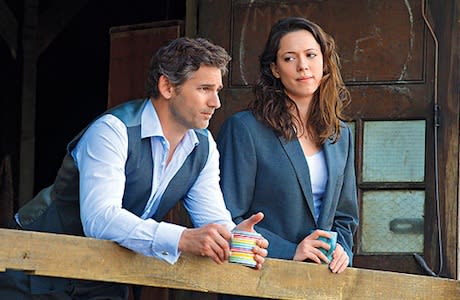Oddly, one of the only appealing aspects about Closed Circuit (John Crowley's redundant, overly talky exercise in cultural parroting) is revealed in the trailer. It's a twist that's visible from miles away, but a twist nonetheless, which, in a film reiterating humdrum Bourne vernacular with the seriousness and self-importance of a Robert Redford film gone modern, is really all there is to look forward to.
In the opening, a bomb goes off in a crowded marketplace, captured by multiple surveillance cameras, splintering perspectives on the situation, having the potential to suggest fluidity in perception, but instead making a broader, less acute observation about bigger panopticon thinking. Farroukh Erdogan (Denis Moschitto), the man accused of triggering the explosion, is believed innocent by newly appointed attorney Martin Rose (Eric Bana), who's given the job after the previous lawyer mysteriously met his end, falling off a roof.
Lazily, the British attorney general (Jim Broadbent) unknowingly assigns Martin's ex-lover, Claudia (Rebecca Hall) — the woman that helped expedite his divorce — as a special advisor on the matter, which adds some lethargic human melodrama to a standard government conspiracy template.
For the first part of the film, the pair, along with a reporter (Julia Stiles), a fellow attorney (Ciaran Hinds) and, most amusingly, a child hacker, unravels a series of expected cover-ups, connecting the accused to MI6 and other governmental factions. The political implications are, ostensibly, relevant, commenting vaguely on draconian politics and Big Brother in a post-9/11 environment, exaggerated by the surveillance template. However, this righteousness is undone by increasingly ridiculous plotting and a tendency to evade bigger commentary on the many minor social observations that are revealed and then discarded.
Seemingly, screenwriter Steven Knight became aware that his mealy exposition and banal thriller contrivances weren't quite working, shifting gears to a chase thriller in the third act, which derails any legitimate preceding commentary. It's unfortunate that such mediocrity comes off so poorly under John Crowley's unambiguous direction, since the performers (Broadbent and Hall, in particular) do fantastic things with atrocious dialogue, adding complexity where there would otherwise be none.
Closed Circuit isn't the sort of bad movie that aggravates or angers in any way; it's too meek and diffident. It's just something that isn't memorable and doesn't inspire the intended reflections about a society content to imprison itself under the gaze of corrupt people incapable of managing boundless power.
(eOne)In the opening, a bomb goes off in a crowded marketplace, captured by multiple surveillance cameras, splintering perspectives on the situation, having the potential to suggest fluidity in perception, but instead making a broader, less acute observation about bigger panopticon thinking. Farroukh Erdogan (Denis Moschitto), the man accused of triggering the explosion, is believed innocent by newly appointed attorney Martin Rose (Eric Bana), who's given the job after the previous lawyer mysteriously met his end, falling off a roof.
Lazily, the British attorney general (Jim Broadbent) unknowingly assigns Martin's ex-lover, Claudia (Rebecca Hall) — the woman that helped expedite his divorce — as a special advisor on the matter, which adds some lethargic human melodrama to a standard government conspiracy template.
For the first part of the film, the pair, along with a reporter (Julia Stiles), a fellow attorney (Ciaran Hinds) and, most amusingly, a child hacker, unravels a series of expected cover-ups, connecting the accused to MI6 and other governmental factions. The political implications are, ostensibly, relevant, commenting vaguely on draconian politics and Big Brother in a post-9/11 environment, exaggerated by the surveillance template. However, this righteousness is undone by increasingly ridiculous plotting and a tendency to evade bigger commentary on the many minor social observations that are revealed and then discarded.
Seemingly, screenwriter Steven Knight became aware that his mealy exposition and banal thriller contrivances weren't quite working, shifting gears to a chase thriller in the third act, which derails any legitimate preceding commentary. It's unfortunate that such mediocrity comes off so poorly under John Crowley's unambiguous direction, since the performers (Broadbent and Hall, in particular) do fantastic things with atrocious dialogue, adding complexity where there would otherwise be none.
Closed Circuit isn't the sort of bad movie that aggravates or angers in any way; it's too meek and diffident. It's just something that isn't memorable and doesn't inspire the intended reflections about a society content to imprison itself under the gaze of corrupt people incapable of managing boundless power.
